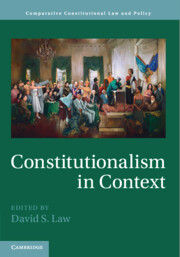Book contents
- Reviews
- Constitutionalism in Context
- Comparative Constitutional Law and Policy
- Constitutionalism in Context
- Copyright page
- Dedication
- Contents by Topic
- Contents by Region
- Figures
- Tables
- Contributors
- User’s Guide and Preface
- Abbreviations
- I Introduction to the Field
- II Concepts and Definitions
- III Constitutional Drafting and Revision
- IV Constitutional Adjudication and Interpretation
- V Rights
- 12 Social and Economic Rights: Argentina
- 13 LGBTQ Rights: Singapore
- 14 Indigenous Rights: New Zealand
- 15 Citizenship and Nationality: Cyprus
- 16 Affirmative Action: Brazil
- VI Structure
- VII Challenges to Liberal Democratic Constitutionalism
- Index
- References
12 - Social and Economic Rights: Argentina
from V - Rights
Published online by Cambridge University Press: 17 February 2022
- Reviews
- Constitutionalism in Context
- Comparative Constitutional Law and Policy
- Constitutionalism in Context
- Copyright page
- Dedication
- Contents by Topic
- Contents by Region
- Figures
- Tables
- Contributors
- User’s Guide and Preface
- Abbreviations
- I Introduction to the Field
- II Concepts and Definitions
- III Constitutional Drafting and Revision
- IV Constitutional Adjudication and Interpretation
- V Rights
- 12 Social and Economic Rights: Argentina
- 13 LGBTQ Rights: Singapore
- 14 Indigenous Rights: New Zealand
- 15 Citizenship and Nationality: Cyprus
- 16 Affirmative Action: Brazil
- VI Structure
- VII Challenges to Liberal Democratic Constitutionalism
- Index
- References
Summary
The 1994 Argentine constitutional reforms introduced a plethora of economic, social and cultural rights to the text of the constitution, along with innovative procedural devices for vindicating those rights. More than two decades later, we have a wealth of experience with judicial interpretation and enforcement of these rights, and civil society use of the rights to pursue complex policy goals. This chapter explores that experience and describes the ways in which certain rights – such as the right to health, housing and a healthy environment – have been enforced through judicial orders. It focuses especially on the various ways in which courts have addressed the difficult task of designing, implementing and monitoring solutions to alleged violations of rights, when those violations have complex social and economic roots and any solutions consequently require extensive and long-term state involvement.
Keywords
- Type
- Chapter
- Information
- Constitutionalism in Context , pp. 263 - 280Publisher: Cambridge University PressPrint publication year: 2022
References
Primary Sources
Secondary Sources
- 1
- Cited by

